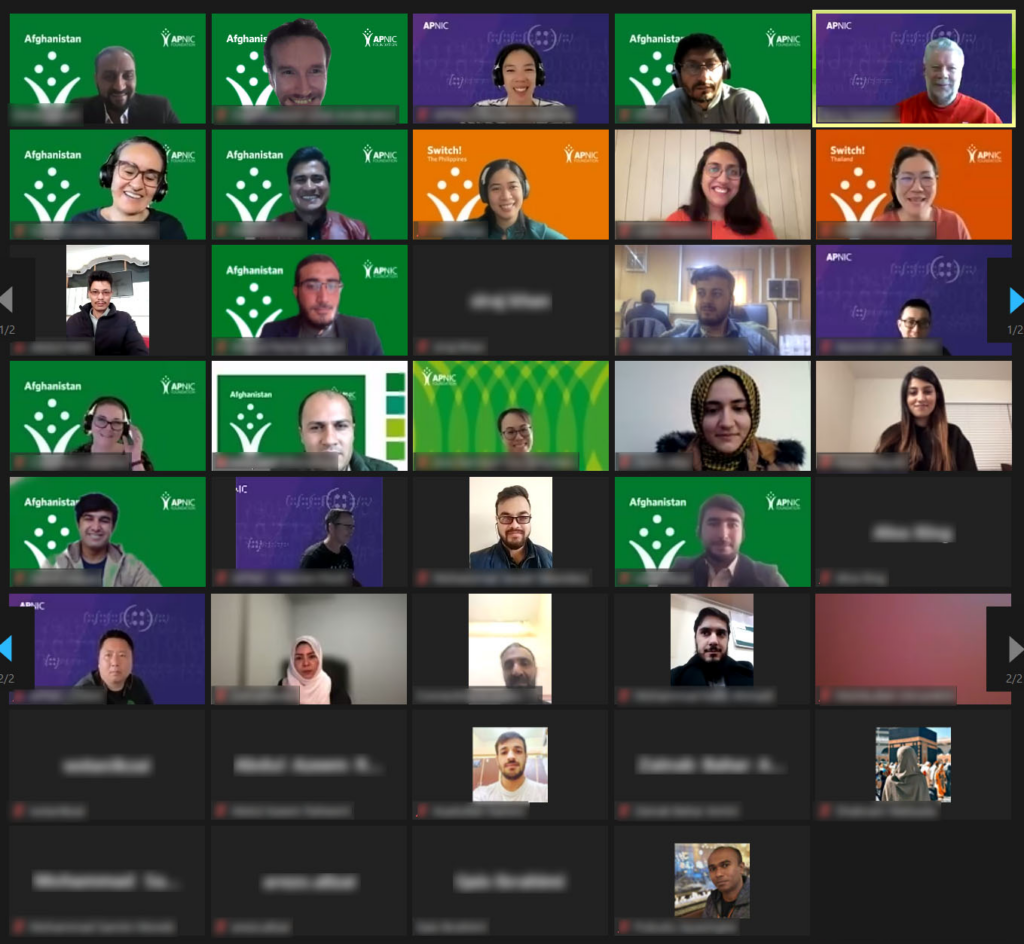Foundation Projects
Technical Training and Mentoring Support to Internet Professionals in Afghanistan
APNIC Foundation
The need:
Network engineers and professionals in Afghanistan face challenges in accessing technical training, mentoring and related platforms. Recent events, security issues, isolation, and employment challenges have forced technical professionals to leave the country. More specific issues identified through an APNIC Foundation community consultation conducted in 2022 include awareness of technical best practices, knowledge of key Internet topics (infrastructure, management and operation, and security), local and regional engagement, gender and inclusion, localized content and research.
This project concluded at the end of 2023 and in 2024 a new expanded version of the project commenced - Digital Leap South Asia - which included Afghanistan, the Maldives and Pakistan.
About the project:
As recommended by the community consultation and in line with the “Meaningful Impact” pillar of the Foundation, the Technical Training and Mentoring Support to Internet Professionals in Afghanistan project was launched. The project goal is to enhance information, technical knowledge, and local and regional engagement of the Afghan technical community.
It worked to achieve two key objectives of i) Information sharing to enhancing awareness and engagement - through increasing community awareness of APNIC services and technical best practices and enhancing its engagement with the regional technical community; ii) Professional development- through improved access to technical training and mentoring, technical knowledge, expertise and resources related to network operations and security.
The project contributed to enabling the Asia Pacific Internet community in providing meaningful and efficient access to the Internet, from a technical and operational perspective and enhancing technical and operational knowledge creating an informed and collaborative community.
Summary:
By December 2022, an initial group of 34 project participants were identified and due diligence was completed. Participants that were confirmed were able to create their own Professional Development Plans (PDPs). Two participants, however, dropped out before the end of the year, leaving a group of 32, including 23 men and nine women, to receive support during 2023.
The first six months of the project focused on initial planning and technical training. Participants formulated their PDPs, objectives, and activities, including online training courses and certification exams. New partnerships were forged with companies such as CBT Nuggets and Coursera, while existing partnerships with CompTIA and LinkedIn Learning were made available to access online training and certifications.
In the subsequent six months, emphasis was put on monitoring the completion of the PDPs and community engagement, with support provided to three local Internet initiatives to resume operation, namely the Afghanistan Internet Governance Forum (A-IGF), Afghanistan Youth IGF (AyIGF), and Afghanistan School on Internet Governance (AFSIG). In addition, the project supported the establishment of a brand-new initiative, the Afghanistan Network Operator Group (AFNOG). Progress during this period includes successful execution of key activities related to technical knowledge, skills, awareness, and community engagement.
Project Highlights:
- The project significantly surpassed its targets by recruiting and engaging 32 Afghan participants - more than double the initial target of 15.
- Of the project participants nine were female, constituting 60% of the initial target and approximately 28% of the overall project.
- Six participants were from Afghan diaspora, and the remainder resided in various regions, including Kabul and provinces. This distribution and spread reflects the reach and impact of the project beyond specific strata or localities.
- 31 out of the total recruited Afghan participants carefully completed their PD Plans, requesting 287 courses and learning activities; This detailed planning showcased the commitment of the participants to their professional development providing a solid foundation for focused and on demand learning.
- Course completion- out of the requested courses, 178 were approved, with a notable 127 (71%) of reported as completed by participants. By the end of the reporting period, participants received 84 training and professional certifications. Challenges in completing the remainder include budgetary constraints and transfer complexities. Additionally, some of the courses remained incomplete due to participant-related factors, such as time and shifting priorities.
- Diverse learning providers- participants requested to engage with 28 PD providers, ensuring a diverse and comprehensive learning experience. Exposure to a broad range of providers enriched the perspectives and skill sets of the participants, fostering a unique approach to professional development.
- Active participant progress reporting- by the end of the reporting period, 91% of participants reported monthly progress (the remaining 9% may have been from the 3 inactive participants). This high reporting rate signifies active involvement and commitment of the project in supporting ongoing development of participants.

For budget information, see the relevant annual reports.
Related:


